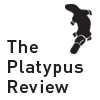A panel event held at New York University on April 18th, 2013.
Transcripted in Platypus Review #57 (Click on banner to see):

Recently, a series of exchanges between the Communist Party of Great Britain (PCC), the International Bolshevik Tendency, and the Platypus Affiliated Society has unfolded, mapping a field of positions and historical perspectives whose contours trace some of the most provocative contemporary perspectives on Marxism, socialism, and democracy.
With this public forum speakers will take stock of the points of convergence and divergence that have emerged in order to push the conversation further on key issues such as Left unity, neo-Kautskyism, factionalism, Trotskyism, sectarianism, Leninism and Bolshevism, democratic organization and political program. The event will feature:
James Turley (CPGB)
Bhaskar Sunkara (Jacobin)
Benjamin Blumberg (Platypus)
Please see the link below for a helpful compilation of debates between the Communist Party of Great Britain (PCC), the International Bolshevik Tendency, and the Platypus Affiliated Society.
The full compilation may be found here.
A panel event held on December 6th, 2012, at New York University.
This past US election season saw an array of positions on the Left concerning the outcome that might follow from either major party’s victory. Among them, there were some who openly supported the incumbent Barack Obama as the lesser of two evils, others who opposed him by casting a vote for another candidate, and still others who followed the abstentionist line by not voting at all. Many of those who voted for “four more years” did so under the assumption that the Democrats were a broadly center-left party with vaguely social-democratic tendencies, who might be pushed to reverse neoliberal policies and stave off measures of austerity. Some, while generally less optimistic, endorsed Obama on the premise that organizing a mass movement against capitalism would be easier with the Democrats in power. Others argued that Obama had done nothing to deserve reelection, offering no hope for either change or progress moving forward. The rest, who took no stance either for or against any party, chose instead to eschew electoral politics altogether.
Now that the quadrennial plebiscite for the “leader of the free world” has resulted in a Democratic victory, we are afforded a brief chance to critically evaluate the prospects for the Left’s transition into the next four years. What is different today from four years ago, when Obama’s election seemed departure from eight years under Bush? Did the last four years signal progress or regress for the Left? How will the terrain shift for the Left with another term under the president? In terms of foreign policy, will there be an end to the wars? Or will US militarism continue unabated? Domestically, will government social programs and infrastructure deteriorate yet further? Or will legislative reforms breathe life back into the moribund welfare state? Should we, in fact, take for granted the idea that keeping Romney out of office promises a better environment in which the Left to organize? What does the future hold for a Left caught in the stale air of the status quo?
Panelists:
Ben Campbell (The North Star)
Annie Day (Revolution)
Chris Maisano (DSA, Jacobin)
Bhaskar Sunkara (Jacobin)
Moderator:
Tana Forrester (Platypus Affiliated Society)

